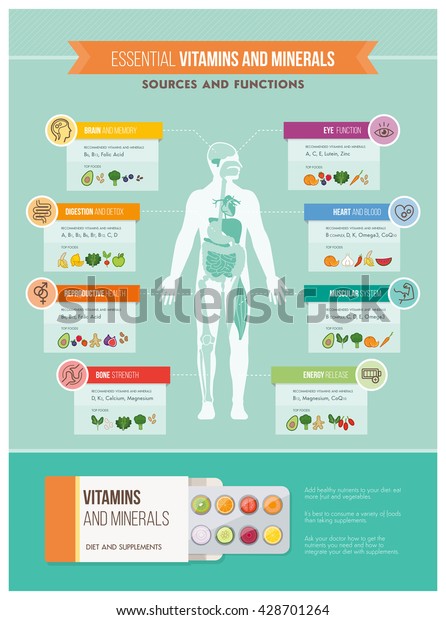Nutrition Required by the Body

The Essential Nutrients
Vitamins
Vitamins are organic compounds that the body needs to function properly. They are essential for maintaining healthy skin, bones, and organs, as well as for supporting the immune system. There are 13 vitamins that the body requires, including A, C, D, E, K, and the B vitamins.
Sources of Vitamins
Minerals
Minerals are inorganic substances that the body needs to function properly. They are essential for building strong bones and teeth, regulating body fluids, and supporting the nervous system. There are 16 minerals that the body requires, including calcium, iron, magnesium, potassium, and zinc.
Sources of Minerals
Protein
Protein is an essential nutrient that the body uses to build and repair tissues. It is also important for making enzymes, hormones, and other molecules that the body needs to function properly. Protein is made up of amino acids, which the body cannot produce on its own and must obtain from food.
Sources of Protein
Meat, poultry, fish, beans, lentils, nuts, seeds, dairy products
Carbohydrates
Carbohydrates are the body's primary source of energy. They are essential for fueling the brain and muscles, and for regulating blood sugar levels. Carbohydrates can be divided into two categories: simple and complex.
Sources of Carbohydrates
Fats
Fats are an essential nutrient that the body uses for energy, insulation, and protection of vital organs. There are three main types of fats: saturated, unsaturated, and trans fats.
Sources of Fats
Recommended Daily Intake
The recommended daily intake of each essential nutrient varies depending on age, gender, and activity level. The following table provides a general guideline for recommended daily intake based on age and gender.
| Nutrient | Age 19-30 | Age 31-50 | Age 51+ |
|---|---|---|---|
| Calories | 2,400-2,800 | 2,200-2,600 | 2,000-2,400 |
| Protein (grams) | 56 | 56 | 56 |
| Carbohydrates (grams) | 281-325 | 253-293 | 225-259 |
| Fat (grams) | 78-101 | 67-87 | 56-75 |
| Vitamin A (micrograms) | 700 | 700 | 700 |
| Vitamin C (milligrams) | 75 | 75 | 75 |
| Vitamin D (micrograms) | 15 | 15 | 20 |
| Vitamin E (milligrams) | 15 | 15 | 15 |
| Vitamin K (micrograms) | 90 | 90 | 90 |
| Calcium (milligrams) | 1,000 | 1,000 | 1,200 |
| Iron (milligrams) | 8 | 8 | 8 |
| Magnesium (milligrams) | 400 | 400 | 420 |
| Potassium (milligrams) | 3,400 | 2,600 | 2,600 |
| Zinc (milligrams) | 11 | 11 | 8 |
The Benefits of Good Nutrition
Good nutrition has numerous benefits for the body and mind, including:
- Improved energy levels
- Stronger immune system
- Healthy skin, hair, and nails
- Better sleep quality
- Reduced risk of chronic diseases, such as heart disease, diabetes, and cancer
- Improved mental health and cognitive function
- Healthy weight management
The Downsides of Poor Nutrition
Poor nutrition can have negative effects on the body and mind, including:
- Low energy levels
- Increased risk of infections and illnesses
- Poor skin, hair, and nail health
- Difficulty sleeping
- Increased risk of chronic diseases, such as heart disease, diabetes, and cancer
- Poor mental health and cognitive function
- Unhealthy weight gain or loss
FAQ
What are the essential nutrients required by the body?
The essential nutrients required by the body include vitamins, minerals, protein, carbohydrates, and fats.
What is the recommended daily intake of essential nutrients?
The recommended daily intake of essential nutrients varies depending on age, gender, and activity level. It is important to consult with a healthcare professional to determine your individual needs.
What are the benefits of good nutrition?
The benefits of good nutrition include improved energy levels, stronger immune system, healthy skin, hair, and nails, better sleep quality, reduced risk of chronic diseases, improved mental health and cognitive function, and healthy weight management.
What are the downsides of poor nutrition?
The downsides of poor nutrition include low energy levels, increased risk of infections and illnesses, poor skin, hair, and nail health, difficulty sleeping, increased risk of chronic diseases, poor mental health and cognitive function, and unhealthy weight gain or loss.
Conclusion
Good nutrition is essential for maintaining a healthy body and mind. By ensuring that we consume a variety of essential nutrients, we can improve our energy levels, support growth and development, and protect against disease. It is important to consult with a healthcare professional to determine our individual needs and to make sure that we are consuming the recommended daily intake of essential nutrients.
